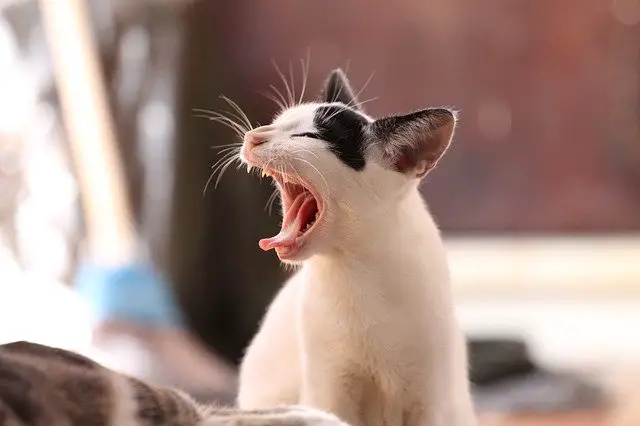If your old cat yowls a lot, the reason may be:
- Hyperthyroidism; a condition resulting from an overactive thyroid gland.
- Cognitive dysfunction, or simply put, old-age induced dementia.
- Sensory decline. As cats get older, so do their senses deteriorate, which ends up disorienting them.
- Pain. They may simply be externalizing their discomfort and asking for help.
- Hypertension, or high blood pressure.
- Central nervous system disease, oftentimes a tumor.
Why Does My Old Cat Yowl so Much?
As is the case with most animals, the lion’s share (pun intended) of cat communication is performed non-verbally. Instead of vocalizing, felines tend to alternate posture, tilt heads, release scents, and employ a plethora of gestures in order to get their point across.
A yowl, however, is one of the more common noises that a cat can make, and it’s not pleasant to hear at all. Therefore, when the question, why does my old cat yowl so much pops up, I have to go through nature and intended use of the sound, before discussing what might be causing the unusual behavior.
What Is a Yowl and Why Do Cats Do It?
A yowl is a drawn-out vocalization, somewhere between a meow and a screech. There’s a reason you feel that it’s grating to the ears; it’s meant to be. Cats use yowls to indicate hurry, distress, or outright hostility. Yowls are usually parts of mating calls, as well as warning signals for other felines who venture into their territory.
Thus, a yowl is a means of cat-to-cat communication, not even meant for human ears. So, when you ask yourself (or anyone else), Why does my old cat yowl so much? you’ve got every right to an answer. When a senior cat keeps emitting hostile sounds for no apparent reason, something has to be bothering it, right?
Well, I am sad to say that that is often the case. An elderly feline who keeps yowling is likely trying to send a message—to anyone or anything who can hear and understand it. And most of the time, that message comes dangerously close to “Help.” Before we can even try to help, however, we will have to determine the reason behind the yowling.
Common Causes of Old Cat Yowling And What To Do About Them
There are plenty of factors that could change cat behavior enough for one to ask, Why does my old cat yowl so much? As it turns out, though, six of them cause the majority of cases of excessive cat vocalization, yowling included. These six causes include:
- Hyperthyroidism
- Cognitive dysfunction
- Sensory decline
- Pain
- Hypertension
- Central nervous system disease (oftentimes a tumor).
All of these are serious conditions and will require one (or several) visits to the vet. Since we already got to this point, though, I will go over all of them, just so you know what to expect. I will also include some more practical advice, though you should only treat those as guidelines. Nothing is really a replacement for an expert’s opinion.
Hyperthyroidism
As the name implies, hyperthyroidism is a condition that results from having an overactive thyroid gland. A cat suffering from this condition will usually be thin, extensively active (especially considering its age), and almost constantly hungry. The disease is also quite common in older cats. About ten percent of cats aged ten and up develop hyperthyroidism at some point in their lives.
There is a light at the end of the tunnel, though. The condition doesn’t have to be fatal—or even too unpleasant for the cat. Treatment options and medication for cat hyperthyroidism do exist, although they don’t always come cheap. A veterinarian will be able to give you a much better estimate than I, but you’ll probably be looking at somewhere between 5 and 6 thousand dollars per year.
If left untreated, though, hyperthyroidism can lead to a plethora of nasty symptoms for the cat, including but not limited to:
- Blindness
- Stroke
- Breathing problems
- Seizures
- Heart disease
- Emaciation
- Extreme thirst and urinary incontinence
Needless to say, we should make sure to provide cats suffering from the condition with the treatment they need. If we can’t, then, unfortunately, putting them down would be a much more humane option.
Cognitive Dysfunction
Yes, dementia doesn’t exclusively affect humans. Felines can suffer from cognitive dysfunction brought on by old age as well, though it’s not nearly as common. Cat dementia actually causes symptoms that are quite similar to Alzheimer’s disease. For those affected, the disease typically starts showing symptoms somewhere between the ages of 10 and 15.
The most common signs of feline cognitive dysfunction (aside from frequent yowling) include:
- General disorientation
- Aimless roaming, sometimes “in circles” around the house” href=”https://sprayingcats.com/stop-cat-spraying-in-the-house-this-works/”>house
- Reduced interest in food or playtime
- Deep and long-lasting sleep
- Random or persistent changes in the cat’s sleep cycle
- Ignoring the litter box” href=”https://sprayingcats.com/cat-wont-use-litter-box-tried-everything/”>litter box
Unfortunately, we currently have no way of reversing cat dementia. All we can do for the unfortunate feline is to try and ease its discomfort and slow further deterioration. Some of the more effective ways of helping our cat through cognitive dysfunction are:
- Keeping it indoors at all times, so that it doesn’t get lost
- Enriching its food with antioxidants and vitamin E, as they are great for brain health
- Regularly taking it to the vet
- Maintaining a regular feeding schedule to try and keep its biorhythm regular
- Avoiding making any major changes to our home, to reduce confusion
- Outfitting litter boxes for easier access, for instance, with a ramp.
Sensory Decline
Old age causes a slew of unwanted changes in any living creature, and cats aren’t exempt from that rule. One of those ailments is a general decline in the quality of vision, hearing, or smell. A cat that finds itself slowly losing its ability to perceive the world will often be confused or even frightened. And a frightened animal will vocalize, preferably using the most potent tool in its arsenal—in this case, the yowl.
If you think of your old cat as an elderly person, shouting “Can you hear me?” over and over, then you won’t have to ask yourself, why does my old cat yowl so much. It wants your attention, and it wants the world to make sense again. You can help them with both, at least up to a point, as a cure for old age hasn’t been discovered yet. Everything that I’ve listed in the section about cognitive dysfunction, you can also apply to a cat suffering from sensory decline.
Sometimes, though, there’s no helping the feline, and euthanasia is the best option.
Pain
What do we do when we’re in a lot of pain? We shout, yell, and scream, of course, at least until we somehow bring our discomfort down to a bearable level. An elderly cat reacts to pain much in the same way that a human being would. It will disregard social niceties and won’t hesitate to keep us awake all through the night.
Old age isn’t kind to anyone, pets included. Aging felines often suffer from dental and gum diseases, joint pain, stomach pain, and the like. Helping them through their ordeals will, of course, be up to us.
So, what can we do to help a cat that is suffering from chronic pain? Of course, the first step should always be a visit to the veterinarian. Pinpointing the cause of an animal’s pain is always a bit of a guessing game, but a professional will have the greatest chances of getting it right. And once they do, they will be able to prescribe the right medication to alleviate it.
Hypertension
Hypertension (or high blood pressure) can lead to a number of unwanted consequences for a feline—old or otherwise. Sometimes it is linked with hyperthyroidism or kidney disease, at other times it isn’t. Luckily, high blood pressure in pets is something that we can usually keep under control with relative ease.
A quick visit to the vet will often lead to a clear diagnosis. The vet will then prescribe the old feline some medication. Said medication would usually do the trick in keeping the cat’s blood pressure down, barring major complications. And once our pet’s discomfort goes away, so will the excessive yowling.
Central Nervous System Disease
Cancer is the most common cause of cat fatalities. The older a feline gets, the higher their chance of getting tumors of all kinds. And it just so happens that the most common brain tumor that cats can develop—the meningioma, often causes behavioral changes. Constant mewling is a common symptom of that tumor.
Like with all cancerous or precancerous conditions, we should always let the vet handle it. They will know exactly what can and should be done. It may not be pretty, but your answer to the question of why does my old cat yowl so much will at least be quick and precise.
Conclusion: An Expert’s Opinion Will Be Crucial
I’m no veterinarian and neither are you, and we shouldn’t fool ourselves into thinking that we know what’s best for our elderly cat when it’s in pain. Asking an expert for their opinion and following their instructions will always be the best thing that we can possibly do. Growing old is never pretty, but just like people, cats can also face their twilight years with dignity. Give your cat the respect it deserves, and hopefully, your answer to the question, Why does my old cat yowl so much? will not have to be tragic.
[su_box title=”Affiliate Disclosure”]This website is supported by its readers. Please assume that all links are affiliate links. If you make a purchase from one of the links we will make a commission from Amazon. Thank you.[/su_box]





